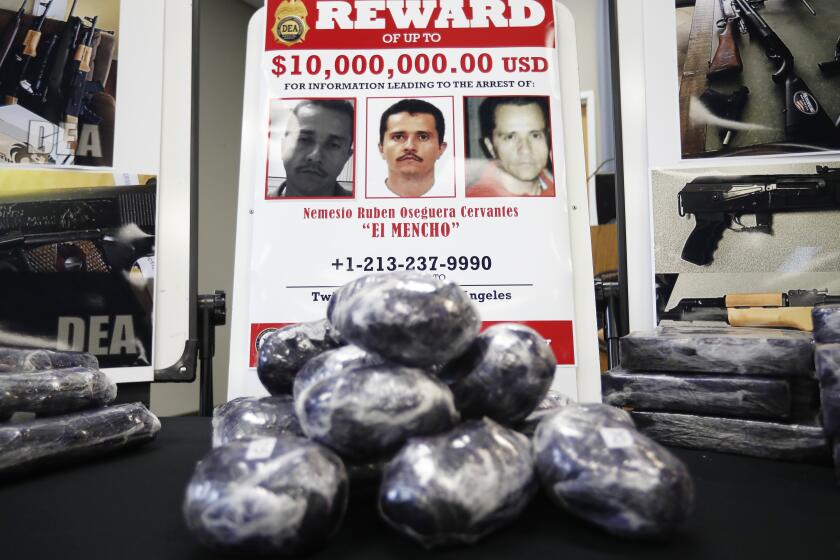Defense Chief Reflects on Invasion Regrets
Defense Secretary Donald H. Rumsfeld said Sunday that he regretted that the United States had not been able to invade Iraq through Turkey, because Iraqi military and intelligence forces in the north of the country melted away to form the insurgency now battling U.S. and Iraqi troops.
Rumsfeld also urged the new government in Iraq to be “darned careful” to avoid staffing the country’s security services with patronage appointments that could undermine their effectiveness.
Rumsfeld made the remarks during two television appearances marking the second anniversary of the U.S. invasion of Iraq.
Two U.S. troops were killed Sunday, the military said. One died near the northern Iraqi city of Kirkuk when a homemade bomb exploded, and the other was slain in action in Al Anbar province west of Baghdad. At least 1,521 members of the American military have died since the beginning of the Iraq war, according to an Associated Press count. In other violence across the country, a U.S. convoy traveling through the Salman Pak area, 15 miles southeast of Baghdad, was attacked, U.S. officials said. Six soldiers and seven militants were wounded.
Asked what he considered to be the greatest mistake of the war, Rumsfeld replied, “Had we been successful in getting the 4th Infantry Division to come in through Turkey in the north when our forces were coming up from the south out of Kuwait, I believe that a considerably smaller number of the Baathists and the regime elements would have escaped.
“More would have been captured or killed. And as a result, the insurgency would have been at a lesser intensity than it is today,” Rumsfeld told ABC’s “This Week.”
“We’ve seen attacks on infrastructure. And they’ve been successful in slowing economic progress and slowing political progress.”
In the run-up to the Iraq war, Washington offered political and economic incentives to try to persuade Ankara to allow the U.S. military to use Turkish territory as a base for the invasion. But with public opinion in Turkey running more than 90% against the war, parliament rejected the prime minister’s request and refused to allow passage of American troops or weapons into Iraq. The Army’s 4th Infantry Division was rerouted and invaded Iraq from Kuwait.
However, a military analyst said Sunday that the delayed arrival of the 4th Infantry Division was far less a factor in the development of the anti-U.S. insurgency than the Pentagon’s failure to plan for postwar security.
“The insurgency came about more because of the chaos that reigned after the fall of Saddam [Hussein] rather than the delayed arrival of the 4th Infantry Division,” which reached Kuwait in early April and Hussein’s hometown of Tikrit by mid-April, said Michael O’Hanlon of the Brookings Institution.
Moreover, the Pentagon could have delayed the invasion for a week or two until the 4th Infantry Division arrived, or it could have sent the division north to hook down to Baghdad in a “hammer and anvil” move, O’Hanlon said.
“Rumsfeld’s never going to admit ... that he was negligent in not formulating a plan for dealing with [postwar] insurgency or lawlessness,” the analyst said.
“In fairness to Rumsfeld ... it’s not in the nature of this job for anybody to admit a mistake that serious while they are in office.”
But Thomas Donnelly, a national security specialist at the American Enterprise Institute, said a northern invasion force “would have made a huge, huge difference” in stabilizing the north in the immediate postwar period.
Donnelly said, however, that no one in the U.S. government understood how extensive the Sunni Muslim resistance would be, or what would be required to put a new Iraqi government in place. So even if Turkey had permitted a northern invasion, “the effect ultimately would have been transitory,” he said.
At the time of the war, the Bush administration was stung by the refusal by Turkey, a member of the North Atlantic Treaty Organization. But a senior State Department official said Sunday that no lasting damage had been done to U.S.-Turkish relations, which “are strong enough to overcome these kinds of events.”
Rumsfeld also said the number of U.S. troops in Iraq, which was increased to 152,000 to provide security for the country’s election, would fall to 135,000 or 140,000 during the coming weeks.
But he warned that once the transitional Iraqi government was formed, the new ministers of defense and interior, who are responsible for fighting the insurgency, should use the “utmost care” in hiring the security forces, because U.S. and Iraqi lives are at stake.
“They have to be darned careful about making a lot of changes just to be putting in their friend or to be putting in someone else from their tribe or from their ethnic group,” Rumsfeld said. “This is too serious a business over there.”
Times wire services contributed to this report.
More to Read
Sign up for Essential California
The most important California stories and recommendations in your inbox every morning.
You may occasionally receive promotional content from the Los Angeles Times.










